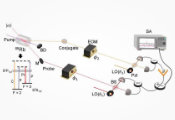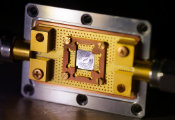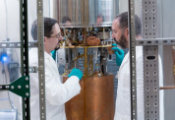Rigetti Wins Innovate UK Competition to Deliver a 24-qubit Quantum Computing System to the NQCC
LONDON, Feb. 05, 2024 -- Rigetti UK Limited, a wholly owned subsidiary of Rigetti Computing, Inc.(“Rigetti” or the “Company”), a pioneer in full-stack quantum-classical computing, today announced that it was awarded a Small Business Research Initiative (SBRI) grant delivered by Innovate UK and funded by the National Quantum Computing Centre (NQCC) to develop and deliver a quantum computer to the NQCC. Rigetti proposes to deploy a 24-qubit quantum computer based on the Company’s fourth generation Ankaa™-class architecture. The system will be deployed at NQCC’s Harwell Campus, which is due to open in 2024 and will serve as NQCC’s landmark facility to support world-class quantum computing research in the UK.
The proposed system will feature the hallmarks of Rigetti’s recently launched 84-qubit Ankaa-2 system, including tunable couplers and a square lattice. This new chip architecture enables faster gate times, higher fidelity, and greater connectivity compared to Rigetti’s previous generations of quantum processing units (QPUs). The Ankaa-2 system has achieved a 98% median 2-qubit fidelity, a 2.5x improvement in error performance compared to the Company’s previous QPUs, and a 2-qubit gate time of 68 nanoseconds — the shortest gate time demonstrated by a Rigetti QPU.
Rigetti’s software development tools for designing and running quantum programs will be deployed with the 24-qubit system, giving NQCC researchers access to pyQuil® to create and execute quantum computing algorithms, Quilc™ to compile and optimize algorithms, and Quil-T™ for pulse-level control. The 24-qubit system will also include Tsunamis™, Rigetti’s industry-leading control systems. Tsunamis are cloud-ready and tuned for hybrid performance. The system will be made available over Rigetti Quantum Cloud Services (QCS™).
“It's a great honor to be one of the first quantum computing companies awarded with the contract to establish a quantum computer at the NQCC’s landmark facility. We are thrilled that the NQCC selected our Ankaa-class system to pursue world-class research to push the boundaries of quantum technology. We believe that the speed at which we are reducing error rates on our Ankaa systems shows us that we have a clear path towards our goal of hitting 99% fidelity,” says Dr. Subodh Kulkarni, Rigetti CEO.
As part of the implementation, in addition to Rigetti’s Tsunami control systems, Riverlane plans to integrate elements of its Quantum Error Correction Stack, including a new generation of its quantum computer control system ‘Deltaflow.Control’, to execute the individual control and readout of Rigetti’s 24-qubit system. Riverlane also plans to develop and deliver a new software platform ‘Aqueduct’ designed to conduct the automation and efficient data management of complex, scalable quantum experiments.
“Controlling qubits is a complex challenge but one that we must tackle to correct the errors found in quantum computers and allow them to scale to the point where they do something useful for society. By integrating our control system ‘Deltaflow.Control’ with Rigetti’s system, we hope to gain a deeper understanding of how to build scalable quantum error correction technologies tailored to large-scale systems like Rigetti’s,” says Steve Brierley, Riverlane Founder & CEO.
Congratulating the testbed competition winners, Dr. Michael Cuthbert, NQCC's Director, commented, "NQCC seeks to accelerate the development of the UK’s quantum computing capabilities and infrastructure. There is a growing realization across the industry that quantum developers need access to the hardware to engineer scalable solutions for a full-stack quantum computer. Once built, these system-level prototypes will help the NQCC and its collaborators to understand the unique characteristics of different hardware approaches, establish appropriate metrics for each qubit architecture, and explore the types of applications that benefit most from each technological approach. That will feed directly into the NQCC's ongoing engagement with organizations across academia, industry and government to develop use cases for early-stage quantum computers, and to identify the innovations that will be needed to accelerate the development and adoption of this transformative technology.”




































